
Fiscal Year 2022-2023
July 1, 2022 - June 30, 2023
This report contains information that may be upsetting to some readers. Confidential resources identified in this report are available to provide support.
Introduction

The Office for Institutional Equity (OIE) is pleased to share the FY2023 Annual Report. Last year’s first OIE Annual Report marked an important moment of transparency and understanding about the work performed by the Office and for establishing a baseline to observe any trends. OIE’s mission is to create, advance, and support a collaborative Duke culture that values diversity, educates on equity and inclusion, and cultivates a sense of belonging for the Duke community.
OIE achieves this through:
- Developing and delivering responsive educational engagements;
- Addressing concerns related to discrimination, harassment, and related misconduct;
- Fostering restoration and reintegration through supportive resolution strategies;
- Supporting and advising on hiring, retention, advancement, and strategic planning; and
- Infusing accountability throughout the enterprise via policy development, collaboration, and networking.
This second OIE Annual Report provides information about Duke’s response to reports of protected status-based discrimination, harassment, sexual misconduct, and retaliation, including the volume and type of reports, how matters are addressed, the consequences that are imposed, and the time to completion. This report also contains information about the frequency and kinds of educational engagements that are requested and delivered by OIE on the advancement of racial equity, response to and prevention of discrimination and harassment, and key issues related to diversity, equity, and inclusion. We hope it provides you with ideas about how we can support you and your unit in these efforts.
OIE is engaged in an ongoing process of evaluation and improvement to build trust with the community. We continuously evaluate our capacity, the complaint-handling process, our relationship and communication with units and individual parties, and the effectiveness and demand for educational engagements. OIE connects with the community in a variety of ways, including through the OIE Liaison Program which hosts an annual Fall meeting and the Duke Equity Network (DEN). The DEN convenes twice per year to provide information and professional development, and to cultivate opportunities for diversity, equity, and inclusion professionals across the enterprise to network and share their innovations.
This report covers the period of July 1, 2022, through June 30, 2023, Duke University’s fiscal year.
This report includes the following data:
This report includes the following data:
- Number of Reports to OIE Including Harassment, Discrimination, Sexual Misconduct, and Retaliation by Month
- Reports by Affiliation of the Accused
- Origin of Reports (Reports Submitted By)
- Accused Population (Reports Submitted Against)
- Reports by Type
- Reports by Protected Status
- Outcomes by Type
- Assessment and Investigation Timeframes
- Educational Engagements
- OIE Team and Resources
In addition to the data provided in this Annual Report, please visit our website, oie.duke.edu , for more information about our office, policies and procedures, and resources.
Sincerely,
Kimberly D. Hewitt, J.D.
Vice President for Institutional Equity & Chief Diversity Officer
I. Reports to OIE
During the 2022-2023 fiscal year, there were 17,155 students enrolled at Duke: 6,543 undergraduate students, and 10,612 graduate and professional students. Duke University and Duke University Health System together employed 45,502 employees.1
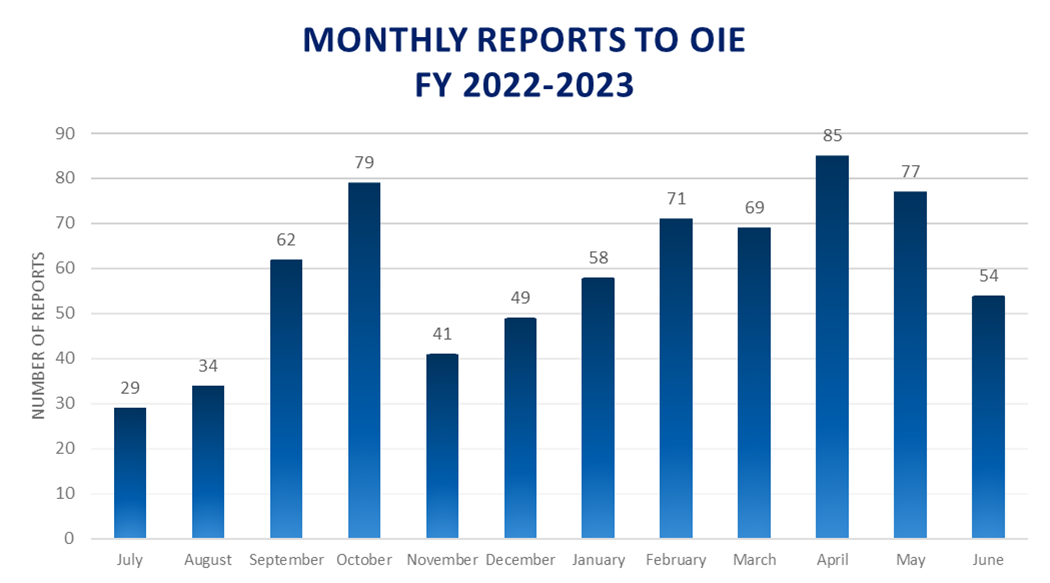
During this time, OIE received 708 reports with an average of 59 reports per month. The bar graph below shows monthly reports to OIE in the 2022-2023 fiscal year as follows: 29 reports in July; 34 reports in August; 62 reports in September; 79 in October; 41 in November; 49 in December; 58 in January; 71 in February; 69 in March; 85 in April; 77 in May; and 54 in June.
1. Student enrollment and employee data obtained from https://facts.duke.edu/.
II. Reports by Affiliation of the Accused
The following pie chart shows the affiliation of the person accused of engaging in misconduct: Central Administration, the Provost’s Office or Schools on Duke campus, the School of Medicine/Duke University Health System (SOM/DUHS), individuals not affiliated with Duke, and unknown. This chart shows the proportion of reports associated with these areas relative to the size of the population overall.
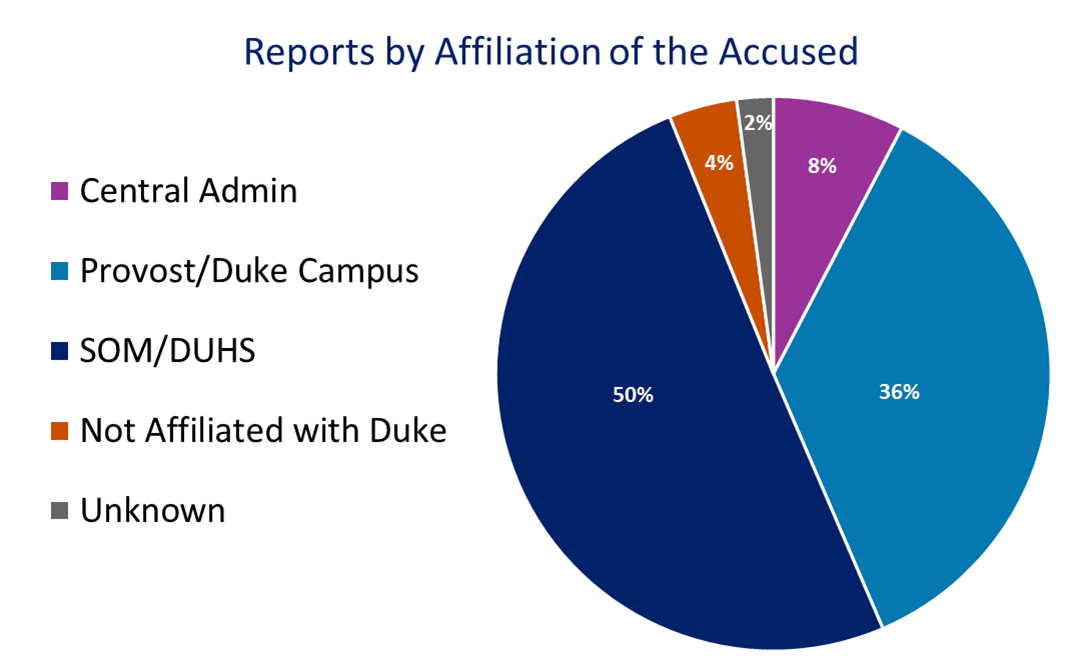
During the 2022-2023 fiscal year, 36% of reports were regarding individuals from Provost/Duke Campus, 50% from the SOM/DUHS, 8% from Central Administration, 4% were unaffiliated with Duke, and 2% were unknown..
The following pie chart shows the percentage of reports per capita per management center. During the 2022-2023 fiscal year, 38% were regarding individuals from Provost/Duke Campus, 54% from the SOM/DUHS, and 8% from Central Administration.
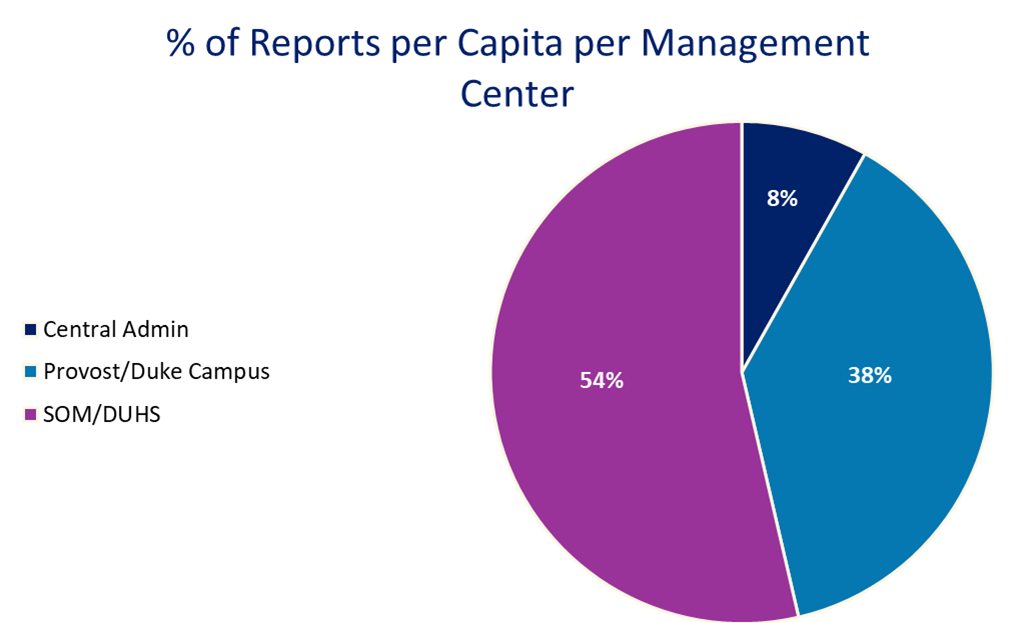
III. Reporting Population
OIE receives reports of concerns related to discrimination, harassment, and related misconduct from all constituents at Duke and from visitors and other third parties. The following graphic shows the breakdown of who reported concerns during the 2022-2023 fiscal year. Consistent with the 2021-2022 fiscal year, the majority of reports came from students and staff.
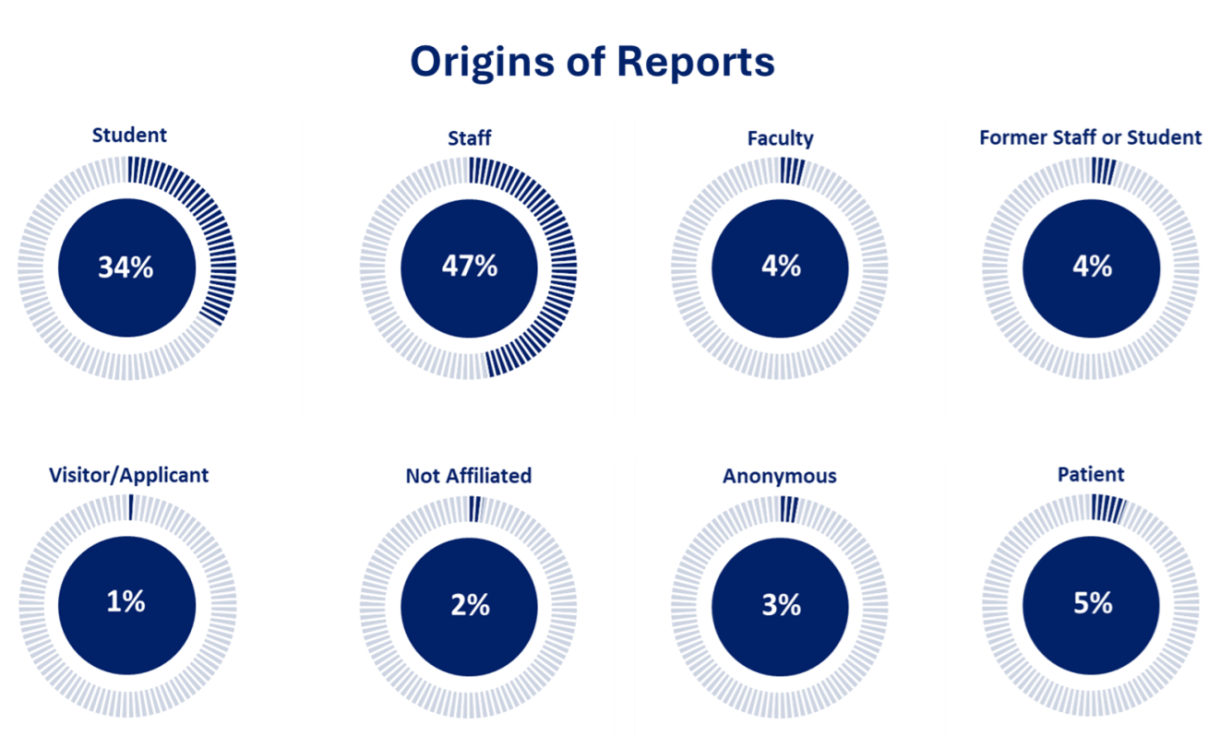
During the 2022-2023 fiscal year, 34% of reports were from students, 47% from staff, 4% from faculty, 4% from former staff or students, 1% from visitors or applicants, 2% from individuals not affiliated with Duke, 3% were anonymous, and 5% from patients.
IV. Accused Population
OIE addresses all reports made against members of the Duke community. When a report is made against someone not a part of the community, OIE provides resources and support to the complainant and engages with outside entities on a response when it is appropriate. The graphic below describes populations of individuals whose conduct was reported to OIE. The majority of reports were made against staff.

During the 2022-2023 fiscal year, 15% of reports were made against students, 55% against staff, 15% against faculty, 0% against patients, 2% against departments, 1% against contractors working for Duke, 5% against individuals not affiliated with Duke, 1% against former staff or former students, 1% against a Duke policy or Duke communications, and in 5% of the cases the accused’s identity was unknown.
V. Types of Reports Received
OIE receives reports of discrimination, harassment, sexual misconduct, retaliation, and related misconduct such as possible violations of the consensual relationship policy and hate/bias. Some reports received do not fall within these categories and are referred to other offices. The following graphic shows a breakdown of the types of reports received, including sexual misconduct, discrimination, harassment, consensual relationship, hate/bias, and retaliation. Reports described below as unknown are those that were filed but not pursued because the complainant decided to not pursue, was non-responsive, or anonymous. Discrimination, harassment, and sexual misconduct reports are the most common.

During the 2022-2023 fiscal year, 25% reports were of discrimination, 28% harassment, 1% the consensual relationships policy, 4% hate/bias, 7% retaliation, 7% non-protected status related complaints, 1% unknown due to the complainant not deciding to pursue, non-responsive, or anonymous, 1% on relationship violence, 4% stalking, 0% violations of supportive measures, and 22% sexual misconduct.
VI. Reports by Protected Status
Duke's Policy on Prohibited Discrimination, Harassment and Related Misconduct (the "Policy") prohibits discrimination and harassment based on age, color, disability, gender, gender expression, gender identity, genetic information, national origin, race, religion, sex (including pregnancy), sexual orientation, and veteran status (collectively known as “protected status”). Due to OIE’s new case management database, OIE is now able to show the percentage of reports by protected status in this year’s annual report.
Of the 708 reports OIE received, the majority involved race and sex followed by gender, as illustrated in the graphic below. Reports of sexual misconduct are included in the category of reports based on the protected status of sex. Comparative data will be provided in future reports.

During the 2022-2023 fiscal year, 13% of the reports were not a protected class or unknown due to an anonymous or unresponsive complainant, 0% related to genetic information, 0% related to veteran status, 2% related to sexual orientation, 20% related to sex, 2% related to religion, 22% related to race, 3% related to gender identity, 2% related to gender expression, 11% related to gender, 6% related to color, 5% related to age, 6% related to national origin, and 8% related to disability.
VII. Case Outcomes
Case outcomes are determined by several factors such as the information reported to OIE, whether the reported conduct falls within the purview of the Policy, the responsiveness of the impacted party, and the impacted party’s wishes, when appropriate.
During the 2022-2023 fiscal year, OIE received 708 reports and closed 608. Some of the cases that closed during the year were cases that had not closed during the 2021-2022 fiscal year. Most cases were closed because the impacted party decided not to pursue the report, withdrew the report, was not responsive, was seeking resources and/or information only, or because the reported conduct did not implicate the Policy and/or was referred to a campus partner.
The total report outcomes of closed matters are as follows: 153 were referred to campus partners; 148 matters were closed because the complainant did not pursue, withdrew, was non-responsive, or was seeking resources and information only; 112 were not covered by the Policy; 83 were resolved through Alternative Resolution; 43 matters were reported for reporting purposes only; 19 were investigations that resulted in no violation of the policy; 14 investigations resulted in a violation of the Policy; 10 referrals to OSCCS; 5 were investigations that were resolved in Alternative Resolution; 15 were referred to OIE’s Diversity, Equity, and Inclusion team for educational engagement; and 6 resulted in limited follow-up due to anonymous reporting[2]. These are documented in the graphic below.
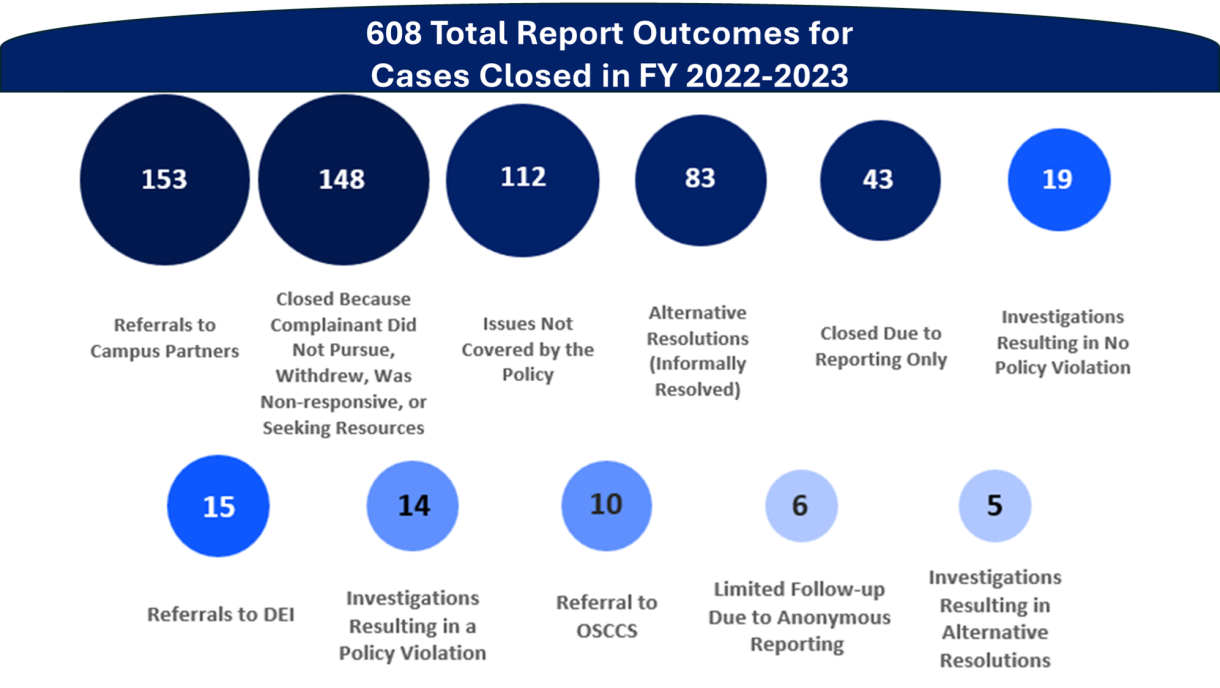
Information on the follow-up actions that resulted from investigations where violations were found is included after the graphic describing the responsive outcomes. In all 14 cases where a violation of policy was found, sanctions were imposed ranging from coaching to termination of employment.
[2] An assessment is a review of a report that may include interviewing witnesses and reviewing evidence to determine whether the matter should proceed to an investigation. OIE completed a total of 90 assessments.
Responsive Actions
A range of actions was imposed in the 14 matters in which a violation of policy was found: termination/ineligible for rehire, suspension, letter of reprimand, resignation, and coaching.
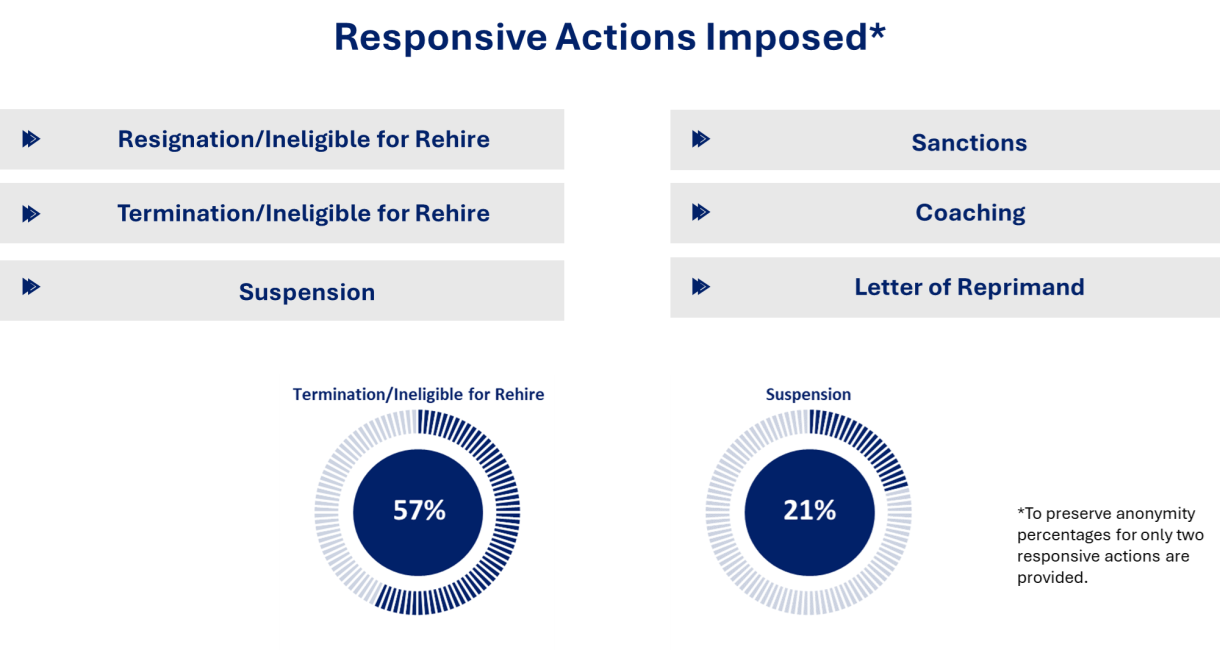
Of the 14 cases where violations were found, 57% resulted in termination/ineligible for rehire and 21% resulted in suspension, as shown in the above graphic.[3]
[3] For context, please see data on the outcomes of the Equal Employment Opportunity Commission. https://www.eeoc.gov/newsroom/eeoc-releases-fiscal-year-2020-enforcement-and-litigation-data
VIII. Assessment and Investigation Timeframes
The timeframes for OIE’s responses to reports are set forth in the written procedures that guide our work. For cases that involve faculty or staff as the accused, OIE seeks to complete assessments within 45 business days. For cases involving students, faculty, or staff, the investigation process (from the notice of investigation/allegations to the completion of the investigation report) is generally completed within 90 business days. For all appeals involving faculty and staff respondents, it will generally take 20 business days from the filing of an appeal statement through a decision from the Appellate Officer. If any of these timelines are extended due to extenuating circumstances, OIE notifies the parties.
OIE remains committed to reducing the time it takes to complete assessments and investigations, while simultaneously maintaining the necessary rigor in evaluating cases. To aid in the more timely completion of cases, OIE has added a program coordinator to the intake team and has dedicated two investigators to conduct DUHS assessments and investigations.
For reports received during the 2022-2023 fiscal year, the average assessment was completed within 45 business days. 90 assessments were completed that did not move to investigation. Of the 90 assessments, 55 were completed in 45 business days or less, and 35 were completed in over 45 business days. 61% of assessments were completed in 45 days or less, 33% in 45-90 days, 5% in 91-120 days, and 1% in 121-180 days.
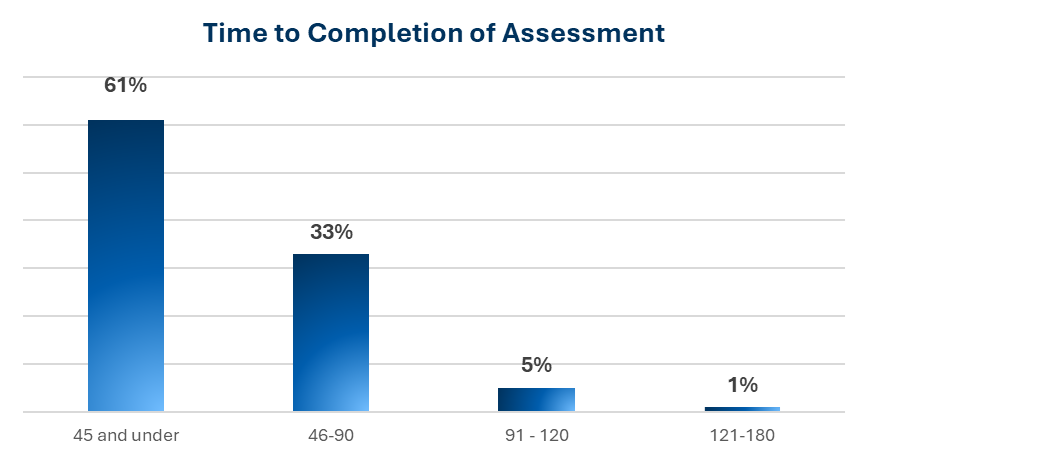
The average investigation was completed within 94 business days. 38 investigations were completed. 58% of the investigations were completed in 90 business days or less, 18% in 91-120 days, 13% in 121-180 days, 8% in 181-240 days, and 3% in 241-300 days.
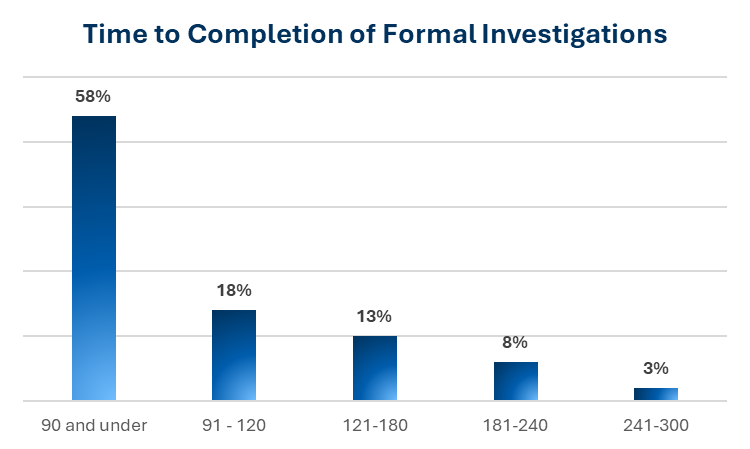
IX. Educational Engagements
Duke is a diverse community committed to the principles that ensure diversity, equity, and inclusion. As part of this commitment, we seek to educate and offer resources in support of diversity, equity and inclusion efforts in units across Duke. We seek to maximize the rich backgrounds and abilities of everyone in our working, learning, and health care environments. We believe that when we understand, celebrate, and tap into our uniqueness to creatively solve problems and address shared goals, the possibilities are limitless.
OIE helps advance Duke’s culture of diversity, inclusion, equity, and belonging through educational opportunities and resources.
Alternative Resolution Techniques (ART) are available voluntarily to parties with a conflict or issue to resolve. ARTs are designed to address a climate concern related to an identity-based or protected class problem. These techniques are meant to resolve interpersonal, small group, and/or large group concerns. In addition to options for resolution between involved parties, there may be other forms of support and education including coaching, listening sessions, workshops, and more. The OIE approach to ART centers the person or people harmed as well as relevant law and Duke policies. These techniques aim to promote equity and reduce disparities in our community. Each member of the ART team is trained in Restorative Justice and works to think about how we repair and restore relationships so all can thrive.
During the 2022-2023 fiscal year, OIE received an average of 4 unique ART eligible engagements per month. Each unique engagement includes multiple smaller engagements to conference with impacted parties, construct and facilitate any conversation, coaching, education, and other support necessary for the situation. In addition, some ART opportunities include an ongoing education and/or support relationship with people and/or groups. Therefore, some unique engagements may resolve after several interactions, while others may be ongoing for weeks or months. ART has been able to successfully respond to issues related to all protected classes, and for all populations across the enterprise. The feedback from participants has been positive, and the ART process continues to develop in ways that support our community
Education
OIE offers recurring and tailored educational engagements that are accessible to the entire Duke community. OIE offered 70 educational opportunities during the 2022-2023 fiscal year with an average of 45 participants per session.
The workshop series is designed to provide education and support on key issues related to diversity, equity, inclusion, and belonging, as well as Duke regulations concerning discrimination, harassment, sexual misconduct, and equal opportunity. The series is open to anyone in the Duke community, in particular to employees interested in increasing skill and workplace culture. The topics are chosen and updated over time, informed by national and local events and the needs of the community. The following is the list of courses offered this year:
OIE Foundational Series Workshops
- Diversity, Equity and Inclusion Building Blocks: Creating meaning, shared language, and manageable action
- Discrimination and Harassment: What do I do when I am confronted with a problem in my unit that might be discrimination, harassment, or sexual misconduct?
- Equitable Hiring Practices: Strategies for increasing the diversity in your unit and beginning to create a positive climate in which to bring new staff
OIE Topic-Specific Educational Sessions
- Diversity, Equity and Inclusion Committees: Relationship Development and Strategic Planning
- Recognizing and Interrupting Ableism in the Workplace
- LGBTQIA Foundations: Awareness, Inclusion, Workplace Considerations
- LGBTQIA Health: Clinical Setting Considerations
- Microaggressions and Implicit Bias: The Basics
- Interrupting Bias I: Foundational Concepts and Intrapersonal Considerations
- Interrupting Bias II: Impact on Relationships and Workplace Interactions
- Inter and Intrapersonal Cultural Humility: Growing Within Ourselves and Our Relationships
- Generational Diversity in the Workplace: Creating a More Inclusive Team
- Trauma Informed Approaches to Leadership and Supervision: A DEI Lens
- Diversity: What’s COVID Got to do with it? (Unraveling Our Collective Trauma)
Additionally, the Diversity, Equity and Inclusion team partners with Duke units and student groups to develop educational engagements tailored to their needs. Through these partnerships, staff, faculty, and students have gained an understanding of diversity, equity, and inclusion issues while deepening engagement with and between individuals.
X. OIE Team & Resources
Office for Institutional Equity
919-684-8222 | oie.duke.edu
The Office for Institutional Equity (OIE) has expanded its team and realigned roles to better leverage the ability to support the University and the Health System. Our diverse team of committed professionals stands ready to support individuals and teams at Duke to create and maintain a climate of excellence where everyone can thrive.

Available Resources
Duke encourages all individuals to seek the support of on- and off-campus resources, regardless of when or where the incident occurred. These resources can provide guidance on reporting options and information about available resources.
Confidential Resources
The following Duke resources can provide confidential counseling, information, and support. These confidential resources are not required to share information with OIE about a report of Prohibited Conduct without the individual’s express written permission unless there is a continuing threat of serious harm to the complainant or to others or there is a legal obligation to reveal such information (e.g., suspected abuse or neglect of a minor). Confidential resources can also help an individual make a report to Duke.
Confidential Resources for Students
Counseling and Psychological Services (CAPS) | 919-660-1000
Gender Violence Intervention Coordinator | GVICoordinator@duke.edu | 984-569-0592
Student Health Services | 919-681-9355 | 919-966-3820 (nurse advice line)
Confidential Resources for Employees
Personal Assistance Service (PAS) | 919-416-1727; for Duke Raleigh Hospital and Wake County based faculty/staff 1-800-327-2251
The Ombuds Office (for the University faculty and staff)
OFF CAMPUS RESIDENTIAL RESOURCES
The following off-campus resources can also provide counseling, information, and support in a confidential setting to students, faculty and staff:
Duke University Hospital Emergency Room - 919-684-2413
Durham Crisis Response Center - 919-403-6562 (English); 919-519-3735 (Spanish)
InterAct Family Safety and Empowerment Center of Wake County - 919-828-7740 (Domestic Violence); 919-828-3005 (Sexual Assault); 844-203-8896 (Spanish)
Orange County Rape Crisis Center - 919-968-4647
Medical concerns/evidence preservation.
Duke encourages individuals to seek assistance from a medical provider or crisis response service immediately after an incident that may require medical attention or preservation of evidence. This provides the opportunity to address physical well-being or health concerns, preserve any available evidence, and begin a timely investigative and remedial response. Emotional care, counseling, and crisis response are also available on and off campus; e.g., at Student Health Services | 919-681-9355, or at Duke University Hospital Emergency Room - 919-684-2413.
Non-Confidential Resources
Individuals are encouraged to report all Prohibited Conduct, including Title IX Sexual Harassment, to OIE. Making a non-confidential report of Prohibited Conduct means that OIE will contact the Complainant to offer resources and support. OIE will also identify the appropriate action to respond to the report as outlined in the Policy. Only a report to the Title IX Coordinator (or an Official with Authority), however, will trigger Duke’s obligation to respond to an allegation of Title IX Sexual Harassment. In the case of a report of Title IX Sexual Harassment, the Title IX Coordinator or designee will contact the Complainant.
For General Questions:
oie-help@duke.edu | 919-684-8222
Any individual can make a report under the Policy to these individuals or any Official with Authority. In addition, many Duke faculty and staff, designated as Responsible Employees, are required to share information with OIE. A report may be made via OIE’s online reporting form, in person, in writing, by telephone, by e-mail, or anonymously. Reports can also be made through the Duke University Speak Up Hotline | 1-800-826-8109 or the Duke Health Integrity Hotline 1-800-826-8109. Any report involving a minor will be shared with law enforcement agencies and child protective services.
Upon receipt of a report of possible Prohibited Conduct, OIE will contact the Complainant to discuss reasonable Supportive Measures to provide for the safety of the parties and the campus community and options for addressing the report.
Law Enforcement
Duke encourages all individuals to report Prohibited Conduct that may involve criminal conduct to the Duke University Police Department or, for incidents taking place off-campus, to the appropriate local law enforcement agency. This could include sexual violence, relationship violence, stalking, dating or domestic violence, and conduct that could be a hate crime. In cases of sexual misconduct involving a minor, members of the Duke community are required to report the situation to Duke University Police Department. Duke Police can be contacted at 919-684-2444 (non-emergencies), or by calling 911 in emergency situations or local law enforcement for incidents that occur off-campus.
Duke Police will respond to emergencies and non-emergencies to provide assistance by intervening in cases of criminal conduct, providing transportation to the Emergency Department, taking reports of criminal conduct, and/or investigating and participating in legal or disciplinary action. They are responsible for notifying the community in a case of continuing danger, issuing a trespass order that requires an individual to stay away from campus or a particular area of campus when needed, and providing referrals and information including how to obtain a restraining order. Criminal conduct that occurs off campus may fall under the jurisdiction of the Durham Police Department or other law enforcement agency. Students may contact the Durham Police directly (911) off campus or 919-560-4427 / 919-560-4609 or Duke Police can help facilitate reporting. Blind reporting—filing a report without one’s name attached to it—is an available option with both Duke Police and Durham Police. Regardless of whether a Complainant pursues a criminal complaint, Duke will take appropriate responsive action to ensure that Duke is free of harassment, prevent the recurrence of a hostile environment, and, as appropriate, remedy the effects of the harassment.
Responsible Employees
Responsible Employees are individuals who must immediately share all known information about all forms of possible Prohibited Conduct, not limited to sexual misconduct, directly with OIE. Responsible Employees include, but are not limited to, all faculty, employees with teaching or supervisory authority, and graduate students with teaching or supervisory authority (including Teaching Assistants acting in their role). Members of the Board of Trustees, the President, Vice Presidents, Deans, Directors, Department Chairs, Academic Administrators, all Athletic Department Staff (including Coaches), HR Representatives/Managers, Principal Investigators, Lab Managers, Nurse Managers, and Student Affairs professionals (including Resident Assistants acting within their role) are also Responsible Employees. Confidential Resources are not Responsible Employees.
Responsible Employees are expected to be discreet but are required by Duke to promptly consult with OIE, sharing known details of the incident, by telephone, email, or the OIE online reporting form. This responsibility applies even if they have directed those involved to report to OIE and even if they believe those involved have, in fact, reported the incident to OIE.
A Responsible Employee’s receipt of information will not automatically trigger an obligation to respond to an allegation of any Prohibited Conduct including Title IX Sexual Harassment. Only a report to the Title IX Coordinator or an Official with Authority will trigger Duke’s obligation to respond to an allegation of Title IX Sexual Harassment. Upon receipt of a report of possible Prohibited Conduct, OIE will consult with the Complainant to offer Supportive Measures, as addressed below, to provide for the safety of the parties and the campus community. Information that is only gathered pursuant to an IRB-approved -research project does not have to be reported to OIE subject to advance approval from OIE.
Individuals who are not required to report Prohibited Conduct to OIE as described above are nonetheless strongly encouraged by Duke to promptly consult with OIE. All other members of the Duke community (including students) are also encouraged to report such incidents.
If you have any questions about whether you are a Responsible Employee or questions regarding your Responsible Employee duties, including whether certain information may be reportable, please promptly contact OIE for clarification.